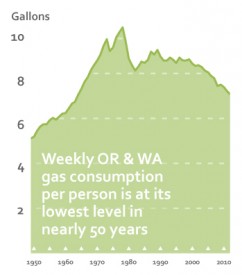Many Northwest drivers are preparing to top up their tanks for travel this Labor Day weekend—and will pay dearly for the privilege. But there’s new evidence that high fuel prices are curbing our appetite for gas.
We detail the evidence in our latest report: Shifting Into Reverse. According to state and federal data, total gasoline consumption in Oregon and Washington in 2011 was about 4 percent lower than it was in 2002—the year that overall motor fuel consumption in the two states peaked. And early data suggests that high prices in the first part of 2012 sent fuel consumption even lower this year.

Meanwhile, the region’s population keeps growing—which means that fuel consumption per person keeps falling. In fact, per capita gasoline consumption is now at its lowest level in nearly 50 years.
The chart to the right shows the long-term trends. Gas consumption per capita skyrocketed during the post-war period, up until the oil crisis of 1979—a year when oil prices spiked. That was followed by years of volatility as the Northwest economy cratered and recovered, and federal fuel economy standards ushered rapid efficiency gains in the vehicle fleet. In the late 1980s, fuel consumption per capita hit a bumpy plateau. But once gas prices started to rise in 1999, the region’s drivers have been consuming less and less gas.
Most of the decline in gas consumption over the last decade can be traced to a simple fact: we’re driving less. Total vehicle travel per capita in the region started to plateau in about 2002—and since the population continued to grow even as vehicle travel essentially flat-lined, per capita vehicle travel on state roads has actually fallen by about 13 percent over the last decade.
Gains in vehicle efficiency have also reduced gas consumption—though less than one might think. At this point, new vehicles are generally more efficient than the ones they replace. But new vehicle sales have slowed since the “great recession,” as car owners are hanging on to old vehicles for longer—which has meant that sales of new, more efficient vehicles have had only a minor impact on the overall efficiency of vehicles on the road.
But in the future, we can expect that rising vehicle efficiency—driven by recently tightened federal fuel economy standards—will continue to drive gasoline consumption downward. Meanwhile, increasing numbers of “baby boomers” are approaching retirement and are driving less as a result, and young people are less attached to their cars than they’ve been in two generations. These and other trends suggest that gas consumption will continue to drop over the next few decades—which is exactly what the state of Washington now predicts (see page 19 of this pdf).
Falling gas consumption is mostly good news: oil creates massive pollution problems, both locally and globally, and the region’s petroleum dependence sucked a record $21.7 billion out of the two states’ economies in 2011 alone. But since we pay for roads with fuel taxes, recent gasoline and driving trends are throwing a monkey wrench into the region’s highway financing plans—and raise major questions about whether the region needs, or can afford, its expensive highway expansion ambitions.
Read all about it in our report!!
We also put together this handy infographic to tell the story in a single shot:



Comments are closed.